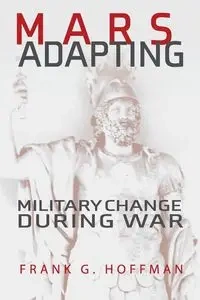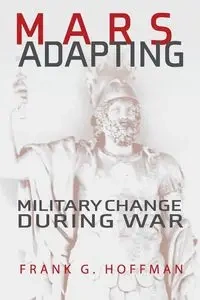Mars Adapting - Francis Hoffman G
Mars Adapting - Francis Hoffman G
- Military Change During War
AutorzyFrancis Hoffman G
As Clausewitz observed, “In war more than anywhere else, things do not turn out as we expect.” The essence of war is a competitive reciprocal relationship with an adversary. Commanders and institutional leaders must recognize shortfalls and resolve gaps rapidly in the middle of the fog of war. The side that reacts best (and absorbs faster) increases its chances of winning. Mars Adapting examines what makes some military organizations better at this contest than others. It explores the institutional characteristics or attributes at play in learning quickly. Adaptation requires a dynamic process of acquiring knowledge, the utilization of that knowledge to alter a unit's skills, and the sharing of that learning to other units to integrate and institutionalize better operational practice.
Mars Adapting explores the internal institutional factors that promote and enable military adaptation. It employs four cases, drawing upon one from each of the U.S. armed services. Each case was an extensive campaign, with several cycles of action/counteraction. In each case the military institution entered the war with an existing mental model of the war they expected to fight. For example, the U.S. Navy prepared for decades to defeat the Japanese Imperial Navy and had developed carried-based aviation. Other capabilities, particularly the Fleet submarine, were applied as a major adaptation. The author establishes a theory called Organizational Learning Capacity that captures the transition of experience and knowledge from individuals into larger and higher levels of each military service through four major steps. The learning/change cycle is influenced, he argues, by four institutional attributes (leadership, organizational culture, learning mechanisms, and dissemination mechanisms). The dynamic interplay of these institutional enablers shaped their ability to perceive and change appropriately.
Mars Adapting explores the internal institutional factors that promote and enable military adaptation. It employs four cases, drawing upon one from each of the U.S. armed services. Each case was an extensive campaign, with several cycles of action/counteraction. In each case the military institution entered the war with an existing mental model of the war they expected to fight. For example, the U.S. Navy prepared for decades to defeat the Japanese Imperial Navy and had developed carried-based aviation. Other capabilities, particularly the Fleet submarine, were applied as a major adaptation. The author establishes a theory called Organizational Learning Capacity that captures the transition of experience and knowledge from individuals into larger and higher levels of each military service through four major steps. The learning/change cycle is influenced, he argues, by four institutional attributes (leadership, organizational culture, learning mechanisms, and dissemination mechanisms). The dynamic interplay of these institutional enablers shaped their ability to perceive and change appropriately.
EAN: 9781557502254
Symbol
397GQA03527KS
Rok wydania
2024
Oprawa
Miekka
Format
15.2x22.9cm
Język
angielski
Strony
370

Bez ryzyka
14 dni na łatwy zwrot

Szeroki asortyment
ponad milion pozycji

Niskie ceny i rabaty
nawet do 50% każdego dnia
Niepotwierdzona zakupem
Ocena: /5
Symbol
397GQA03527KS
Kod producenta
9781557502254
Rok wydania
2024
Oprawa
Miekka
Format
15.2x22.9cm
Język
angielski
Strony
370
Autorzy
Francis Hoffman G

As Clausewitz observed, “In war more than anywhere else, things do not turn out as we expect.” The essence of war is a competitive reciprocal relationship with an adversary. Commanders and institutional leaders must recognize shortfalls and resolve gaps rapidly in the middle of the fog of war. The side that reacts best (and absorbs faster) increases its chances of winning. Mars Adapting examines what makes some military organizations better at this contest than others. It explores the institutional characteristics or attributes at play in learning quickly. Adaptation requires a dynamic process of acquiring knowledge, the utilization of that knowledge to alter a unit's skills, and the sharing of that learning to other units to integrate and institutionalize better operational practice.
Mars Adapting explores the internal institutional factors that promote and enable military adaptation. It employs four cases, drawing upon one from each of the U.S. armed services. Each case was an extensive campaign, with several cycles of action/counteraction. In each case the military institution entered the war with an existing mental model of the war they expected to fight. For example, the U.S. Navy prepared for decades to defeat the Japanese Imperial Navy and had developed carried-based aviation. Other capabilities, particularly the Fleet submarine, were applied as a major adaptation. The author establishes a theory called Organizational Learning Capacity that captures the transition of experience and knowledge from individuals into larger and higher levels of each military service through four major steps. The learning/change cycle is influenced, he argues, by four institutional attributes (leadership, organizational culture, learning mechanisms, and dissemination mechanisms). The dynamic interplay of these institutional enablers shaped their ability to perceive and change appropriately.
Mars Adapting explores the internal institutional factors that promote and enable military adaptation. It employs four cases, drawing upon one from each of the U.S. armed services. Each case was an extensive campaign, with several cycles of action/counteraction. In each case the military institution entered the war with an existing mental model of the war they expected to fight. For example, the U.S. Navy prepared for decades to defeat the Japanese Imperial Navy and had developed carried-based aviation. Other capabilities, particularly the Fleet submarine, were applied as a major adaptation. The author establishes a theory called Organizational Learning Capacity that captures the transition of experience and knowledge from individuals into larger and higher levels of each military service through four major steps. The learning/change cycle is influenced, he argues, by four institutional attributes (leadership, organizational culture, learning mechanisms, and dissemination mechanisms). The dynamic interplay of these institutional enablers shaped their ability to perceive and change appropriately.
EAN: 9781557502254
Niepotwierdzona zakupem
Ocena: /5
Zapytaj o produkt
Niepotwierdzona zakupem
Ocena: /5
Napisz swoją opinię

